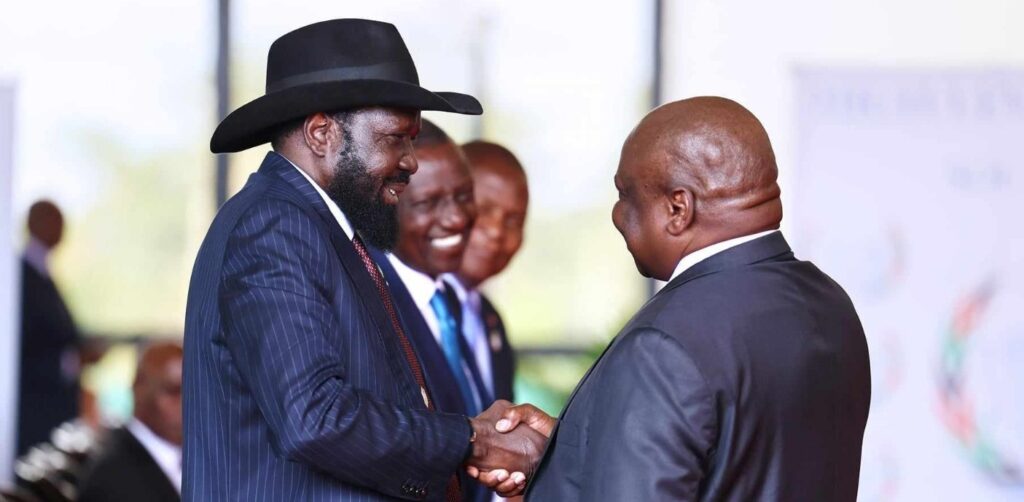A faction of the South Sudan holdout opposition group has welcomed a recent announcement by the transitional government that it is considering resuming the Tumaini Initiative peace talks, which the government had previously declared dead.
The announcement came during an address at the 80th session of the UN General Assembly on Thursday, 25 September, when Vice President Josephine Lagu disclosed that the government is considering resuming the Tumaini Initiative and urged regional and international partners to facilitate the process.
The Kenyan-led peace talks were adjourned indefinitely on 7 February 2025, without a resolution.
In July, President Salva Kiir’s senior advisor and head of the government’s negotiating team for the Tumaini talks, Gen. Kuol Manyang Juuk, declared the initiative dead. He stated it had deviated from its original mandate and attempted to override the 2018 Revitalized Agreement on the Resolution of the Conflict in South Sudan (R-ARCSS).
Launched in Nairobi in May 2024, the Tumaini Initiative aimed to integrate holdout groups that did not sign the 2018 peace deal. These include the Real-SPLM led by Pagan Amum, the South Sudan United Front led by former army chief Paul Malong Awan, the South Sudan People’s Movement/Army (SSPM/A) led by Gen. Stephen Buay Rolnyang, and the NAS-RCC led by Gen. Mario Laku Thomas.
The groups are under a collation calling itself the United People’s Alliance (UPA) under leadership of Pagan Amum.
Speaking to Radio Tamazuj on Tuesday, Lual Dau, secretary general for the opposition United People’s Alliance (UPA), said his group welcomes any effort that could lead to “lasting peace and reconciliation in our country.”
“Our people in South Sudan are suffering, and we believe that peace is the most important thing,” he said.
Dau, who also serves as spokesperson for the UPA, questioned the sincerity of the government’s recent move to declare the peace talks dead without officially informing the opposition or the Kenyan mediators, noting the declaration was conveyed through the media rather than formal diplomatic channels.
“The first statement from the government in Juba was made via the media,” Lual said. “There was no official statement; sometimes we consider it a personal opinion.”
When asked if he believed fresh talks could resume, Dau said the holdout opposition groups are ready for genuine dialogue but that the previous talks stalled because of the government.
“South Sudan has no other options except peace and reconciliation,” he said.
Reaction to Machar’s trial
The opposition spokesperson also expressed concern over the ongoing treason trial of First Vice President Dr. Riek Machar and seven other co-accused SPLM-IO officials. Dau described the court proceedings as “very dangerous” and warned they could lead to “the collapse of the country.”
He called on President Salva Kiir to use his constitutional powers to halt the ongoing trial, warning that a conviction could trigger widespread ethnic violence.
“The president can call the minister of justice and order him to suspend the court proceedings. If the court proceeds, I believe there will be violence and widespread insecurity,” Dau said.
Dau argued that the trial is viewed differently by various segments of South Sudanese society. While government supporters see it as a chance for justice and accountability, he said, many others see it as a “political threat” against Machar and his supporters.
“Reconciliation and peace between the president and the first vice president can reconcile the communities and can extend to the other opposition groups,” he said.
He emphasized that his group believes in justice for all victims of the country’s conflicts but insisted that the current court in Juba is not the right venue. “All of these people should go to a fair court,” Dau said. “The court that is held in Juba is a very dangerous court. It can lead to the collapse of the country.”
The UPA official stated that South Sudan needs comprehensive justice for victims of violence since the country’s independence and the outbreak of civil war in 2013, rather than focusing only on the Nasir incidents. He called on the transitional government and the African Union to focus on forming the hybrid court as stipulated in the 2018 peace agreement.




